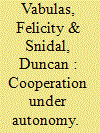| Srl | Item |
| 1 |
ID:
170014


|
|
|
|
|
| Summary/Abstract |
New international agreements often recycle language from previous agreements, using boilerplate solutions alongside customized provisions. The presence of boilerplate in international agreements has important implications for understanding how international rules are made. The determinants behind boilerplate in international agreements have not previously been systematically evaluated. Using original data from a sample of 348 preferential trade agreements (PTAs) adopted between 1989 and 2009, we combine novel text analysis measures with Latent Order Logistic (LOLOG) graph network techniques to assess the determinants behind boilerplate in labor and environmental provisions commonly found in PTAs. Our results indicate that whereas boilerplate can be used for both efficiency and distributive purposes, international boilerplate is used primarily for efficiency gains and power-distribution considerations are not systematically important.
|
|
|
|
|
|
|
|
|
|
|
|
|
|
|
|
| 2 |
ID:
149132


|
|
|
|
|
| Summary/Abstract |
Who supports multilateral treaties and who does not? We offer a systematic account of treaty ratification patterns paying particular attention to different states' roles in international legal cooperation in relation to the United States' ratification behavior. States' ability to influence the terms of treaties and their acceptance increases their incentives for treaty ratification. Multilateral powers—states that are powerful and independent from the United States—support multilateral legal cooperation because it offers them an opportunity to shape treaty content. Their engagement in multilateral treaties is strongest when the United States does not lead. States that are weak and/or dependent cannot greatly affect treaties and are therefore less supportive of them but are subject to US pressure. An empirical analysis of states' decisions to ratify prominent postwar multilateral treaties covering a wide range of global issues supports our argument.
|
|
|
|
|
|
|
|
|
|
|
|
|
|
|
|
| 3 |
ID:
180205


|
|
|
|
|
| Summary/Abstract |
Informal intergovernmental organizations (IIGOs) such as the Proliferation Security Initiative and G20 increasingly play a central role in governing international relations. IIGOs are based on recurrent meetings among high-level state representatives but are not legalized through a treaty and have no permanent secretariat. They allow states to organize internationally without sacrificing autonomy to a supranational entity. We present the IIGO 2.0 dataset, the most comprehensive compilation of these institutions to date, and illustrate the significance of IIGOs through several key empirical findings. First, while the creation of formal IGOs (FIGOs) has plateaued, states are increasingly creating IIGOs to address critical global issues. Second, states disproportionately use IIGOs for high politics issue areas including peace, security, and political agenda-setting which challenges conventional wisdom that IGOs (intergovernmental organizations) are less relevant in the security realm. Third, IIGOs are remarkably durable. Although states could readily formalize or abandon IIGOs, they generally organize cooperation informally for long periods. Finally, IIGOs are typically smaller than FIGOs and this design choice is increasingly used by states of all levels of development, power, and region. The availability of the IIGO 2.0 dataset will promote further analysis on the growing diversity of international institutions.
|
|
|
|
|
|
|
|
|
|
|
|
|
|
|
|